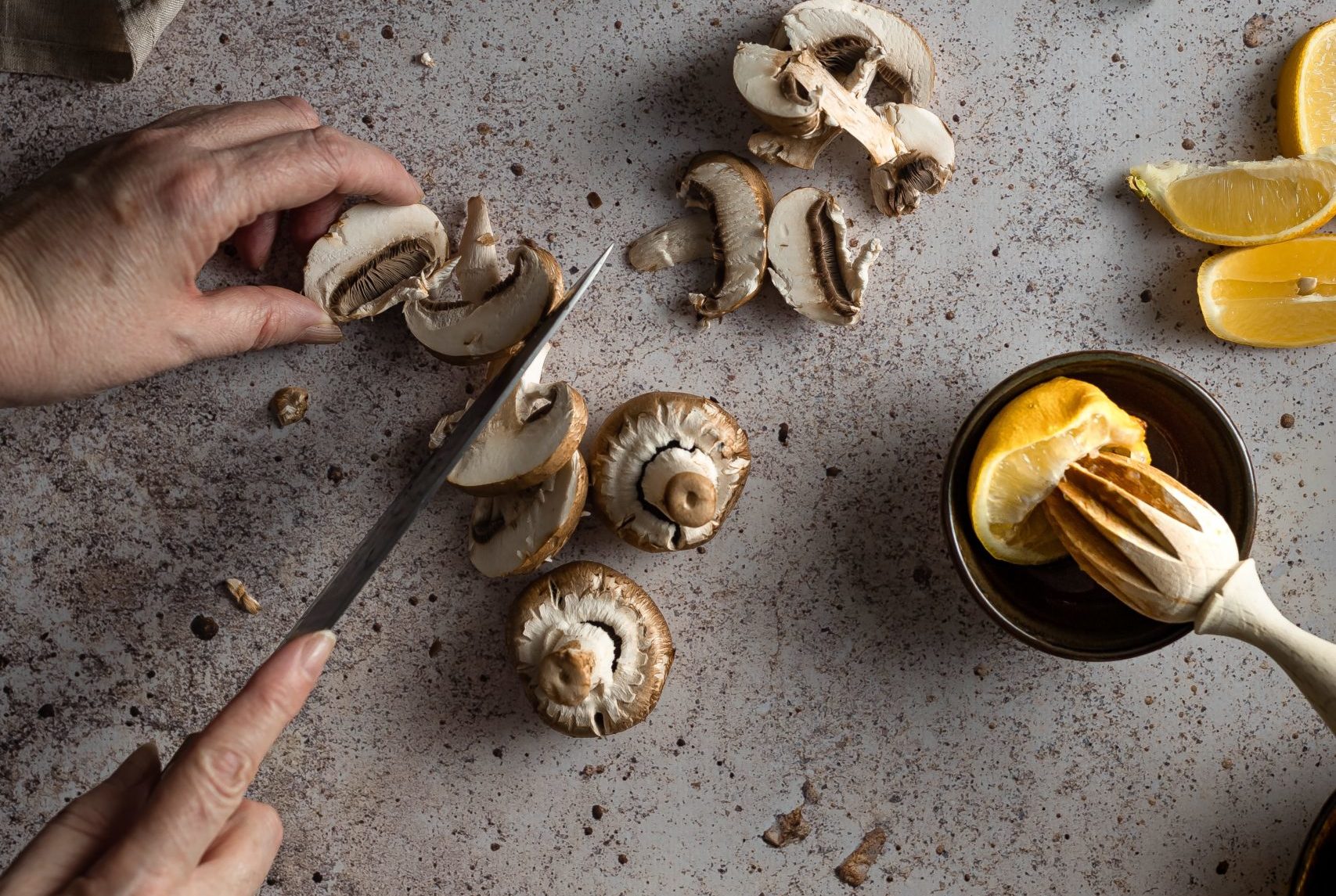
Ernst: Berlin’s most ambitious chef
“Perfect ingredients are not appreciated in Germany,” says Dylan Watson-Brawn. His restaurant project is ambitious – and thus offers room for attack.
In Ahrensfelde, northeast of Berlin, you can still feel the city. In the distance, the highway to Frankfurt (Oder) rushes by. The Blumberg gardener’s yard is hidden between squat clinker brick buildings and bacon-belted hipped-roof houses with thuja hedges. Only women work here, and they have been practicing organic farming for 25 years. This is exactly the kind of place Dylan Watson-Brawn and his partner Spencer Christenson have been looking for for years. Probably hardly anyone knows Brandenburg, the nature of its soils and its farmers as well as these two young Canadian chefs.
Her restaurant, Ernst, is an ambitious and unique venture: Only twelve diners can find a seat at the L-shaped counter. They watch as some 30 miniatures are prepared in the open kitchen: Carrot tossed in raw milk butter and caramelized in its own juices. Grilled cucumber with apple cider vinegar jelly. Turbot with smoky butter. All à la minute. There’s never more than one ingredient on the plate. It is an extremely purist and also risky cuisine that stands and falls with the quality of the products, that hides nothing. Internationally, it’s the hot thing right now.
“The first carrot of the year tastes different than the last”
Watson-Brawn plucks an inconspicuous yellow flower from a stalk. It tastes surprising, almost sweet. “Asian salad is what it’s called in German.” Bit of a pretentious term, Watson-Brawn thinks. But then again, typical. There are also Asian snack bars and Chinese pans here, but the way Germans deal with food is rather sausage-like. The fleshy leaves of the ice cabbage that Spencer Christenson has cut in one of the greenhouses, on the other hand, have a fresh, fine acidity. “Nature is getting ready for winter,” he says. You can taste that, he adds. Perhaps the ice weed goes well with the black currant vinegar the two made a few months ago.
Once a week, if possible, they go out into the countryside. Sometimes it’s just the two of them, sometimes others from their seven-person team come along. They want to feel the changes that are taking place in nature.
“After all, the first carrot tastes very different from the last one of the year,” Christenson says. The farmers would know that. That many top chefs in particular have their own gardens is therefore something they consider nonsense: “Pure marketing,” says Watson-Brawn, looking to see if there are any aphids on the kale. How could they possibly acquire the knowledge that farmers have accumulated over decades? They’d rather find the best growers and try to build long-term, stable relationships.
A few thick stalks are standing around crooked in the furrow. The heads of the pointed cabbage have already been harvested. But the two Canadians are not interested in them. With a small knife, they plane a slice from the inside of the stalk. It tastes almost like kohlrabi. They have already tried a few things with the stalks. If you deep-fry them in oil, Watson-Brawn tells them, you could spoon them like bone marrow.
On the way back, they spot a few more half-dried grapes hanging from the greenhouse ceiling – could be something for raisins, an infusion or a juice – dig Jerusalem artichokes out of the ground, tap off the soil, stow their harvest in boxes and load them into the trunk.
“I do wonder what they make of it,” says Maria Natt, who works on the farm, writing the account on a sheet of A4 paper with a squeaky Sharpie: “All I ever do is cook soup with our vegetables.”
There is not even a sink
Ernst’s very first evening takes place in Kreuzberg in the fall of 2014. A narrow staircase leads into a techno-air basement. It smells dusty, musty, but somehow like adventure. In Berlin, after all, the most interesting things have been created in weird niches. Clubs and galleries. Why not a restaurant? For a perfectionist like Dylan Watson-Brawn, this dim cellar is only one thing: an imposition. There is no trace of the kitchen that the organizers of the food festival in Markthalle Neun announced. There’s not even a sink, let alone running water.
Eight guests sit at the table, two restaurateurs, four journalists, two advanced foodies who have eaten pretty much everywhere. All of them live in Berlin. Watson-Brawn is one to watch out for. The strange lad who has a plan.
In the basement without a kitchen, where he’s now supposed to be cooking a menu, he stands around a bit hunched over, his shoulders slumped. He speaks politely, softly, precisely. He is 21, and at this point he has already worked on three continents, in restaurants that are all among the world’s best. No chef in Berlin can boast similar experience to this slim guy, who only came to Berlin for his girlfriend. Certainly not for the food.
Kitchen speak: Go. Stop. Wash
Born near Vancouver, Watson-Brawn grew up on Salt Spring Island, in the very southwest of Canada, right on the border with the USA. His father is a dentist. Food is important to the family, he says. Where he comes from is one of Canada’s organic farming strongholds. There’s raw milk butter and meat from grass-fed cows. He likes his grandmother’s garden. From an early age, he’s interested in nature. And early on, he can’t stand one thing: School.
At 15, he starts working in the kitchen of a restaurant. At 16, he is part of the brigade. The chef, a Belgian, had previously worked in a three-star restaurant. At 16, Watson-Brawn travels to Japan with his father. In Tokyo, they eat at Ryugin, a famous restaurant. Half in jest, he asks after the meal if he can work in the kitchen sometime. Shortly after, he receives an e-mail. He could start tomorrow.
“In the beginning, I almost cried every day, after 16 hours of work.” Washing dishes, peeling vegetables, cutting. The tasks are mundane, the pressure high: “If you do something wrong, they throw it away, and you have to do it again.”
He is the only foreigner in the kitchen. The kitchen language is a gibberish of Japanese, French and English: Go. Stop. Wash. After two months, they asked him how old he was anyway. He had just turned 17 then. “Then my boss got a bit of a weird fixation on me.” They wanted him to stay for three years. That was the minimum, he said. In Japan, it takes 15 years to train as a chef.
Japanese high cuisine, as celebrated at Ryugin, is a nod to nature and the beauty of the seasons. Seiji Yamamoto, the chef, is considered an eccentric in his homeland: “Hardly any chefs create new dishes in Japan. Yamamoto is one of the few who do. That’s why he’s an outsider: too wild, too far from the norm. At some point, when you go very far outside the norm, you’re celebrated for it in Japan.” Yamamoto’s work is extremely pro-duction. And he gets goods that money couldn’t buy: “Wild eel, for example. There’s practically no such thing. Yamamoto gets the biggest ones in all of Japan. It’s not about money, it’s about status.”
Start working in a Berlin restaurant? He wouldn’t know which one.
When Watson-Brawn had to quit and leave Japan after a year and a half because of ongoing visa difficulties at Ryugin, Seiji Yamamoto had his third star and moved up to No. 21 on the San Pellegrino list of the world’s best restaurants. Eleven Madison Park in New York and Noma in Copenhagen also topped that list, the restaurants where Watson-Brawn will make subsequent stops.
Then he lands in Berlin. Start at a restaurant? He wouldn’t know which one. All the concepts seem so unfocused to him. Superficial, full of compromises, without their own identity.
“Complexity is celebrated here, not clarity,” he says. And certainly not product quality, as in Japan. “Perfect ingredients are not appreciated in Germany.” Watson-Brawn wants to get something of his own going.
Then he meets Spencer Christenson. He’s his opposite in some ways. Christenson studied creative writing, was bored with his office job as a copywriter and, up to that point, had only ever helped out in the restaurant business in the service department. Together they begin a hermit’s life revolving around cooking.
An apartment in Wedding on the third floor of a corner building in the summer of 2015. First you walk down a long hallway, at the end of which is a room. A round table stands in the middle, around it six Mid-Century chairs made of light wood. On the sideboard is a water bottle with a piece of coal and the first cookbook of Magnus Nilsson, the cook of Fäviken in the Swedish wilderness. In one of the recipes in this book, there is the famous sentence that one should use potatoes that have been pulled out of the ground 15 minutes before.
There are six people at the table. A Japanese woman who opened the first organic restaurant in Tokyo, a man from Singapore who organizes high-end food events in Australia, three graduates of the Slow Food University in Turin, two are from Norway, one from South Korea, and a guest from Berlin. The Ernst, Watson-Brawn’s supper club, now has a worldwide reputation.
One course consists of “medium rare” potatoes.
If you want to eat here, you have to wait eight weeks for a seat.
Watson-Brawn is a bit enigmatic, a bit aloof, and above all: zero pleasing. He has a clear idea, and he follows through with it. Some things sound strange at first. He uses practically no salt. He has an almost esoteric idea of the freshness of products.
And he has his own opinions about cooking points. One course consists of “medium rare” potatoes. They’re half raw at the core. And he serves things that aren’t available anywhere else. A two-year-old chicken. The meat is as flavorful and juicy as if it came from a duck. Christenson and he discovered the chickens at a game breeder in Brandenburg, where they were running around the farm. The operator now sells cars. And Watson-Brawn can do things that no one in Germany can: Ike Jime, for example. This Japanese technique involves killing fish by stabbing them in the brain in such a way that it minimizes stress for the animal and increases the quality of the meat.
In early 2019, everyone assumes, Ernst will receive its first Michelin star.
In early 2019, everyone assumes, the Ernst will receive its first Michelin star.PHOTOS: MARIAN LENHARD
Guests arrive on Friday and Saturday. Watson-Brawn and Christenson work every day anyway, starting at 8 a.m. They experiment with sourdough cultures, make miso from lentils, pickle oat bran, grow koji mushrooms, put on vinegar, press oil, brew beer, search for the best yeasts. They research the best way to store and age food. And continue to search for the best ingredients. There are two driven people at work here.
They have nothing in common with the supper clubs that are opening up everywhere. Ambitious amateur chefs dabble there, rarely also professionals who had no desire for the restaurant stress. The only thing that looks like a hobby here is the kitchen, a standard model from Ikea. They still have a sous vide cooker, and the smoker is homemade. But Billy Wagner, who now runs the popular Nobelhart & Schmutzig, asked if supper clubs could actually get a Michelin star.
There’s raucous rap on by Ol’ Dirty Bastard.
Fall 2018, back from Ahrensfelde. In the small restaurant at Gerichtstraße 54, which was previously a Wedding-style casino, two French florists are arranging floral arrangements, and a representative specializing in small Champagne houses with dramatic eyeliner is opening a few bottles for tasting. Sultry rap by Ol’ Dirty Bastard plays, followed by Gil Scott-Heron. At the cooking island in the center of the room, people sample and discuss. Guests aren’t coming.
“We’re open one less day now,” Watson-Brawn says. They want to try more, deepen contacts with producers, find new suppliers.
Experimental. No member of the Ernst team is older than 30.
Experimental. No member of the Ernst team is older than 30.PHOTO: MARIAN LENHARD
Ernst has been a real restaurant since August 2017. It has been an eventful year. Shortly after the opening, opinions began to differ about the strict concept. Some find the portions too small, others find the wine selection too ideological, the vegetable content too high, the grilled eel too rubbery. The fact that, like at a concert, tickets for the menus have to be purchased and paid for in advance, even if you get sick at short notice, takes some getting used to.
Influential food blogger Julien Walther counted up the service’s dining versus speaking time and complained that too much English was spoken. Someone who flies around the world to eat at three-star restaurants – his blog is troisetoiles.de – suddenly has a problem with not being served exclusively in German in Germany.
“Sometimes I have the impression that there are people who come here to dislike us”.
The reactions sometimes seem petty. Or has the project become too grandiose? Have Watson-Brawn and Christenson made a mess of things? They are young, only one of the team is over 30, and almost all of them are expats. They are ambitious, and that alone almost passes for provocation in Berlin. They actually do everything differently than the others.
“Sometimes I get the impression there are people who come here to find it stupid,” Watson-Brawn says.
The project has developed quite a following. Gault Millau praises the menu but criticizes the service. The 15 points awarded are respectable, nothing more. The important Michelin star remains absent.
Internationally, reactions are different. Carlo Petrini, a key networker and founder of the Slow Food movement, is impressed. For Steve Plotnicki of New York, considered the king of food bloggers and the creator of “Opinionated About Dining,” an increasingly influential best list, the Ernst is the opening of the year – worldwide. Top chefs from France, England, Denmark, Japan come and cook. Gault Millau has now upgraded Ernst to 16 points. In early 2019, everyone assumes, the Ernst will receive its first Michelin star.
What’s on the menue tomorrow? Depends on the weather
Watson-Brawn and Christenson scored a coup when they brought in Roderick Sloan as a supplier. A Scotsman, he hand-picks crustaceans from the two-degree cold waters of a Norwegian fjord. Sloan is a star: he supplies only five restaurants worldwide. For two years, they called him every week. And in January, they drove to the Arctic Circle to visit him. In the end, Sloan was convinced.
What they’ll be cooking tomorrow? “We don’t know today,” Watson-Brawn says. They usually decide around noon. That’s when he knows what the fish are like that Davide sends. Davide is a young fisherman who lives on the island of Noirmoutier in Brittany. He doesn’t use nets, only fishing lines. If there is a storm, his small boat can’t go out, then Watson-Brawn has to change his menu on the spur of the moment. He briefly checks the marine weather report on his phone. No storm today over the Atlantic.



